Today I leave for a vision quest where I will spend three days alone on a mountain without food. My core intention is to take another step across the threshold from adolescence into adulthood. To initiate myself into a higher state of maturity.
This experience comes at a unique time in my life, where my past choices, what I care about, and my role as Innovation Lead for The Center for Humane Technology converge with a moment of cultural reckoning around the explosion of Generative AI, and the immense possibilities and risks it brings.
As I gather camping gear and research how to use a pocket knife, I find myself taking stock of all the threads of life as if I were on my deathbed. This vision fast feels called for, as I am reckoning with a sense of failure. Not long ago, a trusted friend and collaborator told me I was falling short in the very thing I have been using my platform to warn others not to do.

The following is a meditation on what those words meant to me, a reflection on this moment in the human story, and a prayer for our relationship with innovation.
Our companion for this journey will be the hot-off-the-press episode of The Emerald Podcast by Josh Schrei: So You Want to Be a Sorcerer in the Age of Mythic Powers… (The AI Episode).
While many of the wisest voices in the AI conversation posit that a theological approach is needed, Josh's re-contextualization through a mythic lens demonstrates the wealth of insight available through an alternative worldview. It’s a work of art, and I feel proud to have played a role in inspiring its creation.
Sound bites from the episode, with light paraphrasing, will be in block quotes like the following:
If you want to be a sorcerer in the age of mythic powers, then let’s talk about the true accountability of sorcerers, and the nature of magic and mystery schools. Let’s talk about how humans have traditionally learned how to work with unprecedented powers.
Let’s talk about the consequences when knowledge becomes unmoored from bodies. The consequences when the keys are handed to the apprentice, and the only elders in the room say “Let’s get it to market today! You drive!”
As you watch this old story of a student playing with great powers before he’s ready, try to envision not the beloved mouse, but instead the young and headstrong twenty-something AI founder. Make sure to watch Parts II and III.
📲 Exhibit A: Technology
Not long ago, I stepped off the stage at the Mozilla Responsible AI Challenge. I felt terrific about my talk titled What Is Humane Innovation? I had spoken with strength and compassion about the serious need for AI founders to match innovation with responsibility and wisdom, and had laid out a practical set of things they could do right now. I left the stage to loud applause, with entrepreneurs and investors approaching me to share their experiences or explain that they were touched. In some ways, it was the high point of my time at CHT thus far.
It’s easy to see why such a talk was called for. There are 30x the number of researchers focused on AI/ML innovation than there are focused on safety. This means for every 100 employees at an AI startup working at a frantic pace, there might be three focused on getting it right.
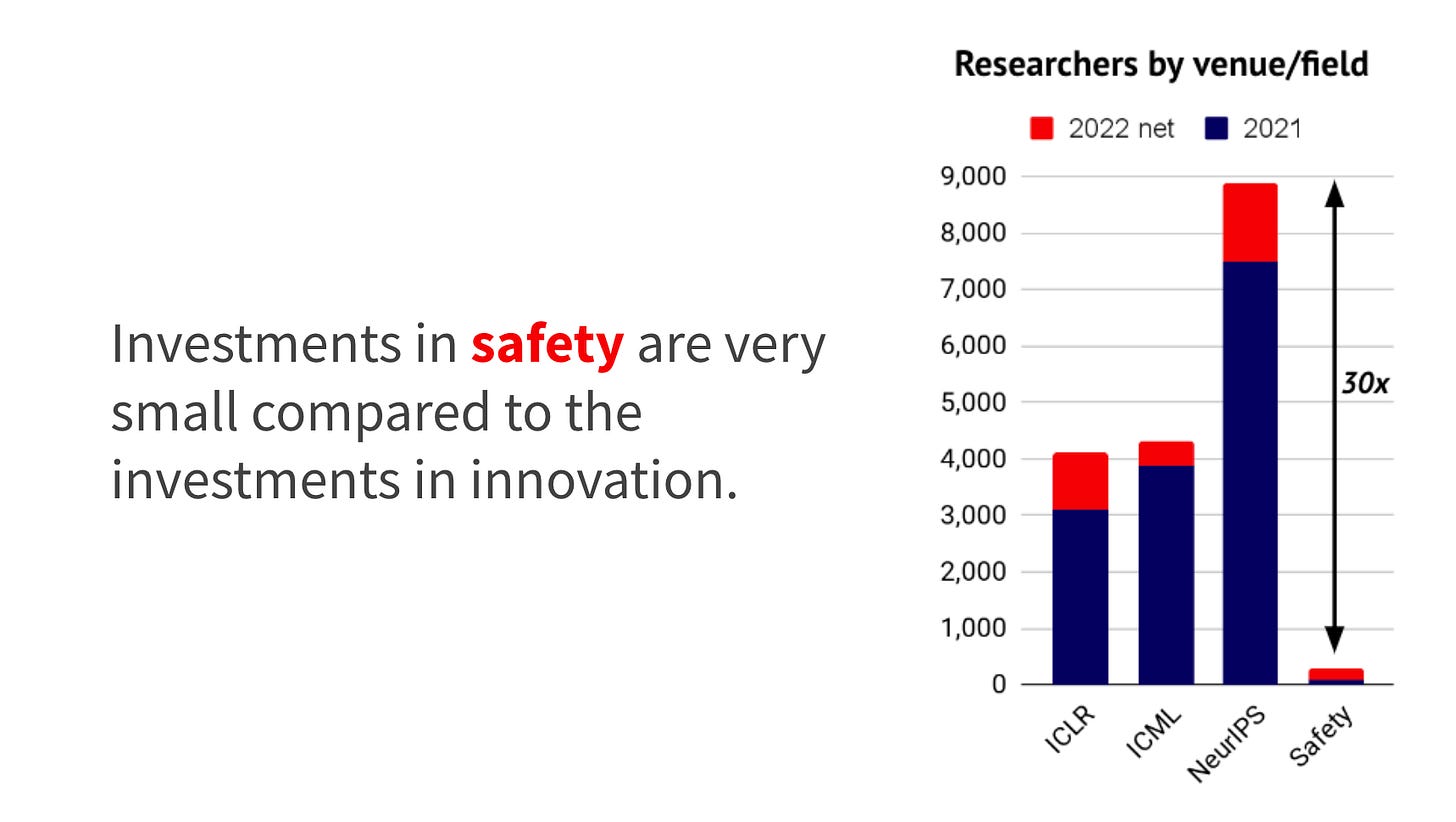
This safety gap doesn’t sound very good, when we’re talking about a class of technology that is both hurting people today, e.g. through bias and discrimination; and poses serious existential risks to life on earth tomorrow, like with automated bio-weapons.
There’s a massive amount of creative impulse moving through the world, and AI will further democratize the tools for anybody to bring an idea to life. There’s lots to celebrate about that. And there’s plenty to be concerned about. We’re playing with fire, in uncharted territory. We ought to exercise caution and try things differently.
But in the absence of rigorous gatekeeping and a technology culture that values wisdom, what safeguards do we have left for innovators of powerful tools? Self regulation is a noble idea, but seldom happens in practice. Government regulation can do the trick, but often lags and gets compromised. Ethics advisory boards and the like are cute, but have no real teeth in a values conflict with economic incentives.
How do we meaningfully shift this situation? Who is role modeling technological maturity? Is anybody laying out a path that we can follow?
The venerable Uncle Ben famously instructed Peter Parker in Spiderman that with great power comes great responsibility. For a moment, let’s say this mythic quote is actually an equation: great power = great responsibility.
On one side, the opportunities, potentials, and rewards of power. On the other side, responsibility: risk management, long term thinking, and clean-up where required. Common sense stuff–if you have the ability to hurt somebody, whether with actions or words, be extra careful! And make things right if and when you do hurt them.
At the Mozilla event, I asked the entrepreneurs: “How's our innovation culture performing on this equation?”
With democratized access to the tools of innovation, almost any teenager has the freedom to launch an app that destroys the fabric of our relationships, facilitate a psychedelic journey that causes permanent injury, or create a viral Tik Tok account with misleading information on mental health. With virtually no accountability.
Innovation has become cheap, while responsibility has become expensive.
In modernity we’ve traded stories of interbeing, virtue ethics, and community accountability for hyper-individualism, growth-at-all costs achievement culture, and narrow definitions of success. A perfect storm that prevents us from even considering what wise innovation would look like. We simply don’t know a different way. We’re coached from birth that we can do anything. Go, go, go!
You have complete lack of a cultural container and context in which such powers could live in a holistic way. You have no true adepts in the house. Who are the elders in this picture? The tech CEO’s and VC’s who are saying “Go for it! Get this out there as fast as possible. Use your powers. Do it. And hey, if what you’ve discovered is really precarious, really potentially disruptive, all the better. Let’s throw half a billion dollars at it.” Are they the elders?
The feedback loops are accelerating, revealing a disturbing reality. ChatGPT reached 100 million users in two months after launch, its amazing and harrowing impacts making front page news, changing how we learn, work, and live. Shining a light on the gap, while great power grows greater. Are there enough adults in the room to contain it? What about elders? Teachers?
The warnings are getting louder. What will it take to finally hear? Will we need to learn some painful ones in order to change our behavior?
It’s a huge step forward just to be aware of the pattern and commit to making a change. It’s a whole ‘nother ballgame to embody the shift, such that when the next opportunity inevitably comes, a different choice is made.
I was flying high following the Mozilla talk, having given voice to something that mattered, and sensing I had touched hearts along the way. I then went to see a friend who has been a close collaborator, ready to tell him I had held a mirror up to entrepreneurs, not expecting he would hold a mirror up to me.
🌱 Exhibit B: Plants
I too have been playing with fire.
Over the last couple of years I’ve been involved with an extraordinary project exploring Middle Eastern plants in the context of Jewish ritual and ceremony. I like to consider myself the ethicist on the team, ensuring that we are bringing these plants into the world with reverence. After all, the world of plant medicine is especially fraught with ethical lapses.
As I’ve been on a journey of deepening my connection with the tradition of my ancestors, I’ve come to believe so much in the potential of using these ancient plants in modern rituals aimed at treating the deep wounds of our people, from Israeli-Palestinian conflict resolution to Jewish ancestral trauma healing. These are powerful, utterly powerful, sacred tools that I feel determined to make more widely accessible. Similarly to AI in its beyond imagination-ness, it only makes sense to talk about the plants mythically.
I met my collaborator at a cliff top park in Berkeley called Indian Rock with a view over the bay. We discussed our thoughts on next steps while watching the sunset. When it dipped behind the distant ocean, he looked me in the eyes and simply asked:
“What do you want, Andrew? You seem to be moving pretty fast. You say you want to bring this safely into the world, but I don’t think you are seriously considering what it would mean to do so. What level of responsibility are you willing to take for the risks of what we do?”
In one moment, I’m warning AI entrepreneurs about the need to go slow. Then, without realizing it, I am eagerly racing ahead with another project, compelled by the excitement of its mysterious unfolding and the impact that seems possible if I keep pushing things forward, even if I don’t really know what I’m doing. Even if I can’t say with my whole being I won’t hurt people along the way. Even when, framed within my Jewish faith, I am doing it for God.
This was a glitch in the matrix of my life. It nauseated me to realize that I hadn’t authentically considered my willingness and ability to contain the fire. How could I look up and realize that I was doing the 30x thing too? Maybe not that extreme, but still a gap I couldn’t see, even with my “top 1%” training in being able to see it.
How lucky I am to have people who care about me enough to call me on this, to say, “Andrew, there is a gap between your actions and your words.” To confront me to get clear on what’s actually going on inside myself. How grateful I am to have come far enough that I can listen.
I felt a wave of empathy for tech visionaries in that moment, appreciating how easy it is to get carried away towards the possibilities of the destination, and how well intended we can be as we leave responsibility in the rear view mirror.
How will we as a culture formulate ethics if we aren’t embodied enough to feel? To slow down, to be patient, to be silent, to take simple steps, to recognize that all that ultimately matters is the web of ecology, not the willfulness of the individual?
Whew. Even when we think we know better, why is it so damn hard to practice what we preach? How can we better account for these blind spots and avoid self deception?
For every conversation about what could be fun or livelihood generating, how often do we speak about the less sexy, more adult stuff: what could go wrong, what we can learn from irresponsible behavior and unintended consequences that keep showing up, how we can set up systems to ensure that we bind power with maturity, actually?
The humbling “revelation on the rock” has slowed my roll in action and speech, but I can still feel this heavy hesitation in my body when I think about what it might take to meaningfully close the gap. There’s still the potential, the promise, the thrill of what could be that commands my attention.
Responsibility is tricky. I don’t actually know how to do it, nobody is making me, I don’t have an Uncle Ben. I don’t know who to ask for help.
How does this all seem so simple and obvious in theory, yet so hard in practice? Why does it feel so often like I’m doing it alone? Why, again and again, from projects to relationships, do I seem to fail?
📣 Exhibit C: Storytelling
This is all happening against the backdrop of working at a non-profit growing in its own power to create and disseminate influential media: podcasts, films, courses and more. I’m watching us change public consciousness at will.
We try to be thoughtful about our sensemaking and resulting messaging. And, like any organization composed of human beings, it’s complex. We sometimes make mistakes as we feel the imperative to move quickly in order to mimetically meet our runaway opponents. Definitely better than 30x, but still falling short of the ideal.
There’s no need to look further than me. I’ve had two different former friends this year tell me I was not there for them when they really needed me. Why? I was literally too busy trying to build a better world…
Whether technology, sacred plants, storytelling or any other powerful tool we use to shift reality, it appears that even the most good faith innovators motivated to get the “power x responsibility” equation right are struggling to act commensurately.
It’s something of a cosmic joke that visionaries have this unique gift of looking to the stars, at the cost of seeing what’s right in front of them, two feet on the ground. Holding valuable sight on what’s possible, so tantalizing that it distracts their attention from the well being of the whole.
How can we help our fellow visionaries see what they have trouble seeing?
As I continue moving, and sometimes stumbling, through my process of self work, I see how many founders and other high achieving types starting high risk projects are among the most awareness-impoverished. So gifted, and yet so immature.
Less awareness x more power is a recipe for unconscious tragedy. Out of ignorance or fear we fail to look at our incentives, motivations, and conditioning. Our blindspots remain hidden. We charge ahead, so often unaware of an inner pain that makes us race.
I’ve experienced it like this: there’s a feeling in me, somewhere well beneath the surface, that says, I get this done, and everything will finally be okay. Some time after dissolving my startup Siempo, I realized that when I connected with the vision and looked really carefully at where my excitement for realizing it was coming from, part of the narrative when something like:
I’ll have created a billion dollar company, helped heal the world… and THEN Paloma will finally like me!
I thought, when I am successful, she will see how wrong she was. Then I will be worthy of being loved. The conditioning runs very deep. As I’ve learned through therapy, so much of my achievement-seeking behavior stems from a fear of being exposed as inadequate, which drives overcompensating strategies like pursuing extreme acts of approval so I’ll NEVER have to feel small or excluded again.
If something like winning over the one that got away or proving somebody wrong is my underlying driver, of course I’m going to feel less sensitive to and responsible for what the cool new thing I’m building does. Because deep down, I’m not as much driven by the mission and vision as I am by the sense that I am not enough, and that once I have “success” I will be.

There’s a sea of other misaligned incentives that might lead one to act from their narrow self interest over the well being of the whole. A CEO doesn’t want to get fired, lose face, money, power, social status, recognition, their lifestyle or whatever they are holding onto. Classic short-term over long-term, Me over We.
When philosopher Nick Bostrom famously asked neural network pioneer Geoffrey Hinton in 2015 why he was progressing AI Research if he thought it would be used for malevolent purposes, Hinton responded: “I could give you the usual arguments, but the truth is that the prospect of discovery is too sweet.”
Then of course there’s competition. People underestimate their desire to win, and to be part of a winning team, regardless of the externalities that winning can create. Competition in an extractive economy drives even the most well-intended actors to compromise on their values in order to stay in the game, thereby retaining all the perks that depend on participation. In game theory this pattern is referred to as the multipolar trap, in which players wind up engaging in harmful behaviors that ultimately harm their collective interests. Not because they want to, but because they will lose potential rewards otherwise. Incentives beat ideals.
In the absence of a more mature culture and economic system, innovators easily get blinded by the light of their visions, misled by the darkness of their pain, and captured by the rules of the game. How did we get here? How on Earth will we find a way out?
🔥 No Innovation Without Initiation

I want a world where our most powerful people have come to be so because their actions and words support the flourishing of life. I want to know that mine will do the same. It’s such a simple longing, yet so far from what we have today.
There’s some type of deep inner transformation necessary before the apprentice is trusted with anything that could actually affect anything. Because otherwise, all of their hidden drives, all of the things they haven’t burned off, all of the things they still have to prove, are going to profoundly impact what they create.
You have to arrive at some internal equilibrium first. To know oneself. Through this process, the initiate starts to learn what it is to start to discern reality from illusion. Their own transitory truths from the deeper truth of nature. Their own transitory impulses from the deeper pulse of how things are.
My upcoming fast falls on Tisha B’Av, a fast day in the Jewish calendar that is considered the saddest day of the year, in memory of the destruction of the temples and other tragedies throughout Jewish history. Like all holidays, this time period is context to reflect on how a specific theme is showing up in life, on the individual and collective level.
I’ll have plenty of time for grief while staring at a moonlit Mt. Shasta, alone and empty seeking answers to the burning questions of my life. When I reflect on what I’m grieving on in this season of my life, it’s culture. It’s the absence of an education relevant to the world I’ve inherited. That those of us in the West have forgotten how to be responsible stewards of life on Earth as individuals, communities, institutions or nations. That we are so far out of our depths in how to match power with responsibility and wisdom. We don’t remember how to love life.
I’m tired and frankly bored of falling short. I want us to make better choices with the power we have. What will it take to stop leaving violence in our wake?
I have spent my career studying how to do tech right. I now feel there is one shift in our thinking that may matter as much as anything. We must build a culture in which the right to power must be earned. Continuously.
Contrary to what the culture of modern consumption would have us believe, there are actual steps to embodying knowledge. There are actual steps to understanding how to be in relation to great powers. Slow, deliberate steps, over time.
This is where, in all the mystery schools and all the magic schools, initiation comes in. In ritual initiatory process, there is a moment of wonder, initiation, death and rebirth and union. The promise of that ecstatic moment, the initiatory moment, death moment, contact of mystery, is the communion with the vastness, and that communion brings about the death of the small self. It blows us apart and shatters us. And at the same time it reconstructs and initiates us, into a place of greater alignment to what is.
And the question for human beings has always been: how to construct cultural and initiatory containers, that can handle and distribute access to this power. So the shaman sorcerer in traditional cultural contexts, is held in a web of relationality and accountability, and they get there through slow, gradual, initiatory steps.
When the power of frenetic seeking is taking me into a space of “Hey! Look what I can do! I can do this, I can summon this power, I can summon that power.” That is the exact time when the elder, the adept, the sorcerer says, “Slow down. Not yet.”
And the responsibility of the elder is to take that younger initiate through a process in which the young person dies, and in which they are reborn, imitated into the web of accountability and relationality that surrounds them.
In the olden days and many intact cultures today, positions of power in the community are tightly gated. Not just any schmo can serve as a teacher (Kabbalists traditionally have to be over 40), let alone a healer (18 years of training for Kogi mamos, or priests) or political leader (the Haudenosaunee screen their chiefs for theft and abuse, and gauge ability to behave responsibly for the clan for seven generations).
When a young person demonstrates powerful abilities, it makes the community nervous because they know what happens when great power goes unchecked. It’s in myths, which are less about something that happened in the past, but something that keeps happening. So they check it.
Initiation protects a person from false lights.
Initiatory experiences have been central to human cultures since time immemorial, designed to dissolve the ego and orient young people (often men) towards a path of service for the whole. Because that old adage: “The child who is not embraced by the village will burn it down to feel its warmth.”
There are a whole lot of traditional cultures that view this human life not in terms of what we get to do, but in terms of what we are required to do. Not in terms of freedom, but in terms of responsibility.
Could it be that the next generation of innovators must undergo a proper initiation experience? What would that right of passage experience look like? Ritual containers and collective agreements to shift their psychology towards what is good, whole and beautiful? Power granted by community and elders only when a healthy relationship with power is demonstrated? This is the inquiry I want to entertain.
It’s a tall order, to re-embody ethics. What does it even look like? It might look like the re-contextualization of human intelligence into its slow, initiatory, ritualized ecology. We must re-discover a pace, a learning method, a communal system in which the steps of actual embodied knowing can unfold and be realized.
It might look like it always has. It might look like a lot of time tending the fire. It might look like silence. It might look like becoming deeply familiar with seasonal cycles, and how those translate into natural cycles of growth and output, and reflection and integration.
Alright, let's build this thing ASAP!
And what do you know, with a big vision of initiatory experiences for technologists comes my familiar pitfalls of rushing to get the essay out, hoping it will prove my worthiness, desiring recognition of being the first mover in the space and competitive edge of locking down the best collaborators…
Oh boy. The conditioning runs deep. At least I’m catching it earlier. Maybe I’ll act differently this time. Or maybe the gap is too big.
How long will decades of training in the old way of doing things take to undo? Hence Frederick Douglass’s claim that “it’s easier to build strong children than repair broken men.”
Easier, yes. But if we don’t address the existing generation of those in power now… How do we orient towards those who already have tremendous power, have not necessarily earned it the traditional sense, and are on the verge of unconsciously doing tremendous harm?
I don't know, but I have feeling the tone of my “revelation on the rock” is relevant. Maybe it’s on those with vision to courageously and creatively point out what these folks can't see. Maybe the myths have inspiration for us too. Seven thousand languages of stories.
Meanwhile, we must work to address the underlying incentives that lead people to act against their collective interests. We can begin designing common sense systems around power, creating conditions for wise action within competitive race dynamics, and coordinating to bind the races altogether.
At the level of external regulation, we can create licensing and compliance for products of a certain scale and risk profile, stricter submission guidelines in app stores, even required credentials adhered to by doctors and lawyers. Set global standards, and provide meaningful resources for monitoring and enforcement.
At the level of innovation culture, let’s normalize engaging the big questions at the earliest stages, overhaul STEM and business education to get real about responsibility, and incentivize alternative startup structures from financing and ownership to governance and culture. Subsidies for sustainable practices, and penalties for non-cooperative behaviors.
At the level of individuals, it’s time to conceive new accountability systems, make virtues like humility and wisdom sexy again, and develop containers for those ready to go the depth required to become humane technologists. Which includes seeing in root causes and systems, confronting self deception, and developing the awareness and strength to make the wisest choice in moments that matter.
I yearn for a cultural innovation in form and scale akin to The Torah to replace the religion of Silicon Valley. I can see a set of teaching stories that leverage familiar myths (from Harry Potter to Steve Jobs), combined with new law and old ritual practices, to be read and performed in teams around an annual cycle. A decelerator to bind innovators to a shared ethics.
In such a world, a question for every leader becomes, “What are you doing to ensure you will use your power well?”
🧿 Where There Is No Vision, The People Perish.
There’s a Jewish prayer for insight that some speak every day. It's a prayer of asking for support in opening one's eyes to see beyond a limited view. To seek the bigger picture and illuminate blind spots in service of being more careful, sensitive, and humble in action and words. To see the wisdom and interconnectedness in all things.
בָּרוּךְ אַתָּה יְיָ אֱלֹהֵֽנוּ מֶֽלֶךְ הָעוֹלָם, פּוֹקֵֽחַ עִוְרִים.
Baruch atah, Adonai Eloheinu, Melech haolam, pokei’ah ivrim.
Blessed are you, ∞, who opens the eyes of the blind.
I head to the mountain for guidance and alignment with the whole. I am committed to earning whatever power that I have and doing what I need to wield it wisely and responsibly.
I have no illusions that this vision fast–while considered a proper rite of passage experience–will be the panacea. But I suspect it will call upon me to reflect on where I can bring greater maturity forward, and reconnect with me an embodied sense of interdependence that might make me feel more accountable to the web of life. To become more of a giver than a taker.
As usual, the real work begins when I return, with days, months, and years of integration (or incorporation, as it’s called in the vision fast world; bringing the knowledge into one’s body). An uphill battle when returning to the scene of the crime that necessitated the journey long overdue.
This fast is one more step to earn my power. One more effort at tempering my ability to cause harm. One more moment when I choose growing up. With each shadow that I face and act of reciprocity upon return, growing one step closer to using my short time on Earth for the highest good.
In The Trail To The Sacred Mountain, Meredith Little & Steven Foster describe how vision comes in many forms, not just a rapturous visual kind of thing.
“Vision is wisdom. Vision insight into the nature of things. Vision is feeling in balance and harmony with all creation. Vision is the ability to see the future. Vision is the ability to dream. Above all, vision is merely opening the eyes to what already is.”
As fate would have it, I will come down the mountain to a house I have chosen to share with a woman who is days away from giving birth (note: I am not the father). Yes, at the very moment of choosing to sever myself from corner-cutting and me-centered youth, stepping across the threshold into mature adult responsibility, I am being invited to mature, and hold myself to a higher standard in the place I call home. New life is watching me, and I want to set a good example. This is part of a series of decisions I am making to grow up. To learn from direct experience about what it means to nurture life.
I don’t want to present all of this as “work” - something grueling and taxing. What if the opposite were true? What if the path of the humane technologist is rich with what we’ve lost? The things that have seeped out of modernity, that are not valued as much in the market today but make life worth living: community, meaning, lifelong learning, re-enchantment, re-sensitization. An embarrassment of riches is available for sorely needed lanterns in the dark.
I’ve been walking this path for several years, and still going. It’s a long road from my frat bro / tech savior past: the only living thing I’m responsible for right now is a houseplant, and it’s not doing so well. But I’m dancing more, watching the birds, paying attention to whispered invitations from those who could use support, even taking an integrity course. And teaching what I need to learn.
Perhaps these questions of power and responsibility are more important than the answers. To be in relationship with, because they will change as new technologies, plants and stories change us. Humane innovation is not a finality, it's a continuous evolution.
May we have wisdom
To earn our power.
By learning where we are blind,
So we can work to fully see.
Art, editing, and thought partnership by dear friend and teacher David Alder of Here and Now Studios (see We Will Call It PALA).
Special thanks to those humane technologists and storytellers who generously shared feedback on this piece: Zoe Wagner, Camille Carlton, Randy Fernando, Sara McCrea, Alison Ramer, David Sauvage, Larry Muhlstein, Kai Macauley.
I’m considering expanding this into a presentation, a course, a longer term learning journey, perhaps a book someday. It’s a question I keep returning to year after year. Please feel free to let me know your reflections and point me in the direction of folks I ought to speak with who know some things about these things. Whether vision quests, corporate innovation, higher education, myth and storytelling, how other cultures relate to innovation, what innovators throughout the ages have learned.
Thank you 💜




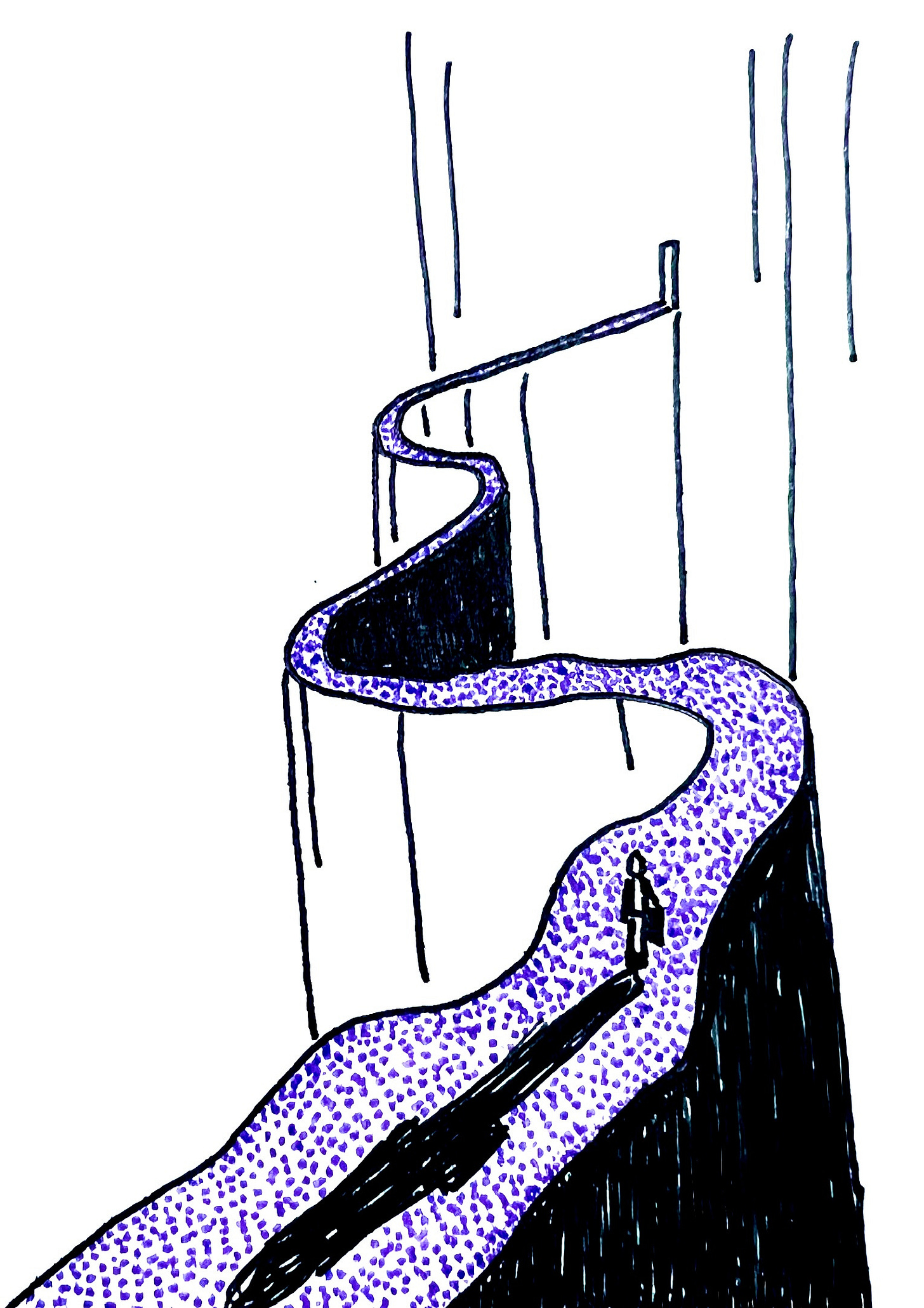
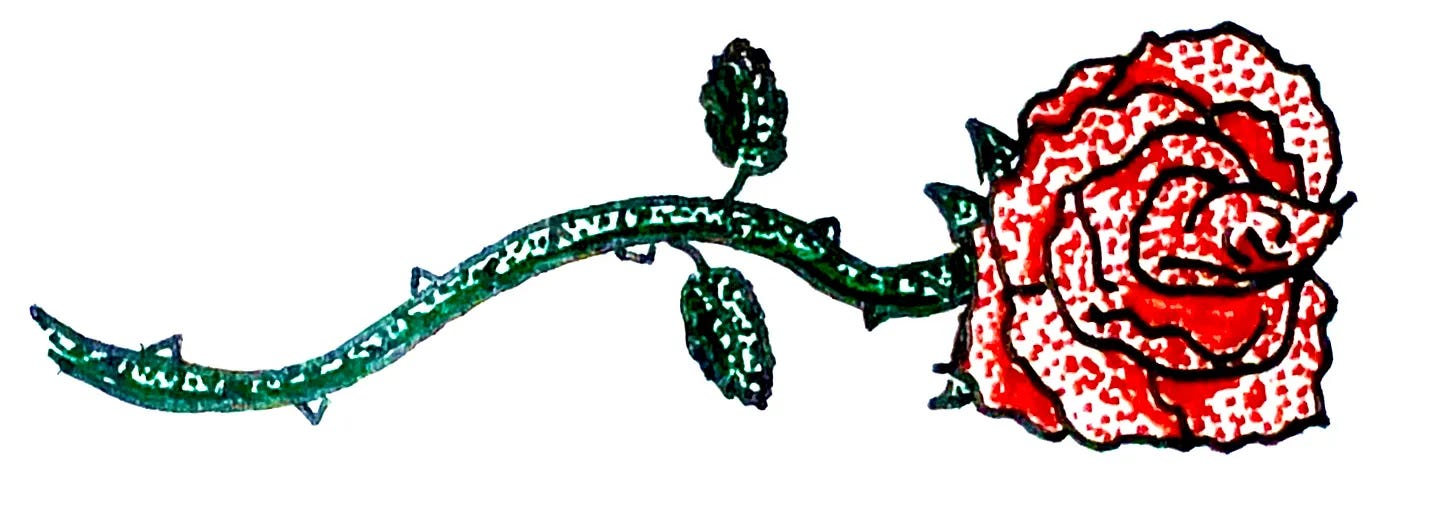


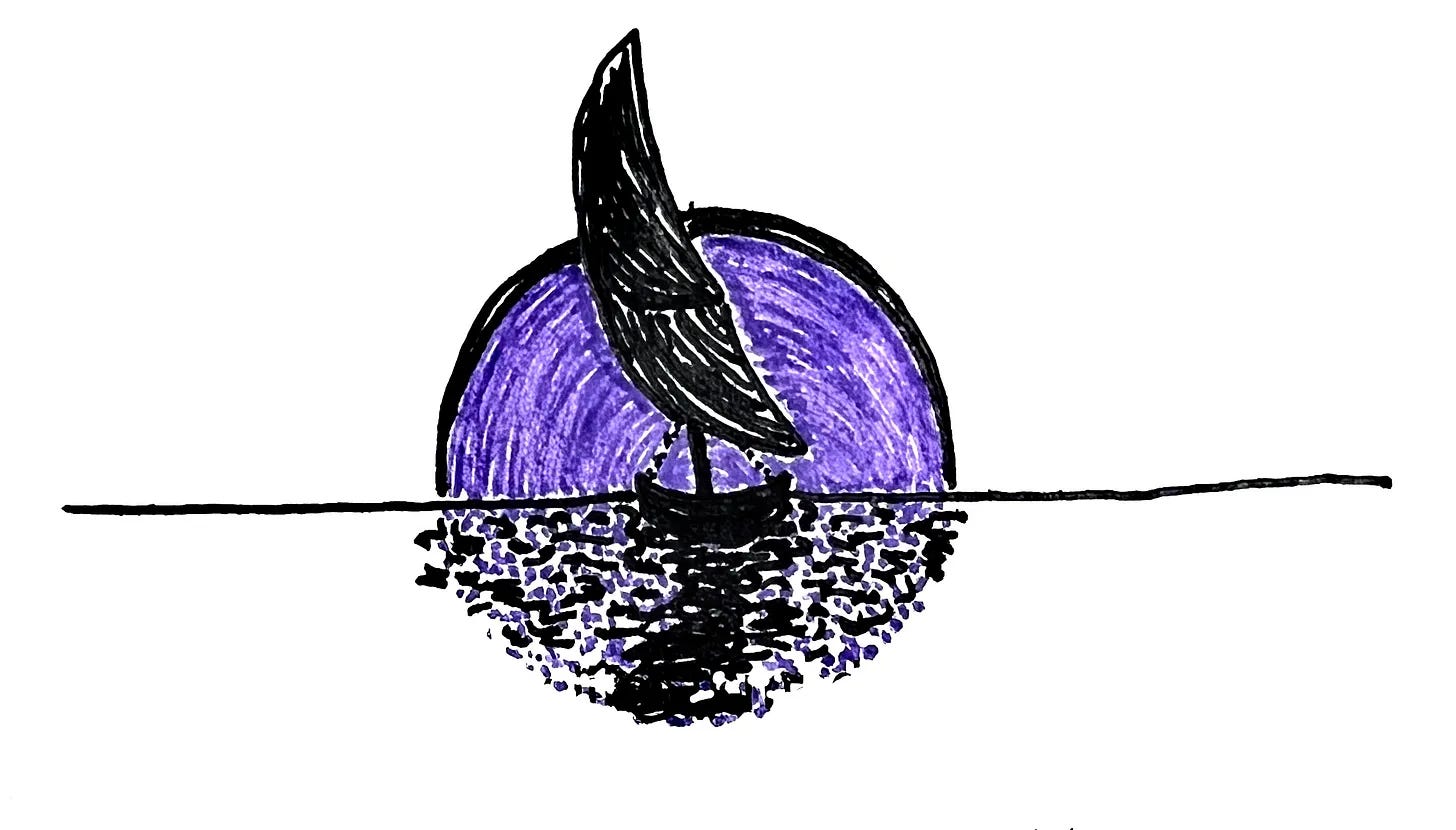

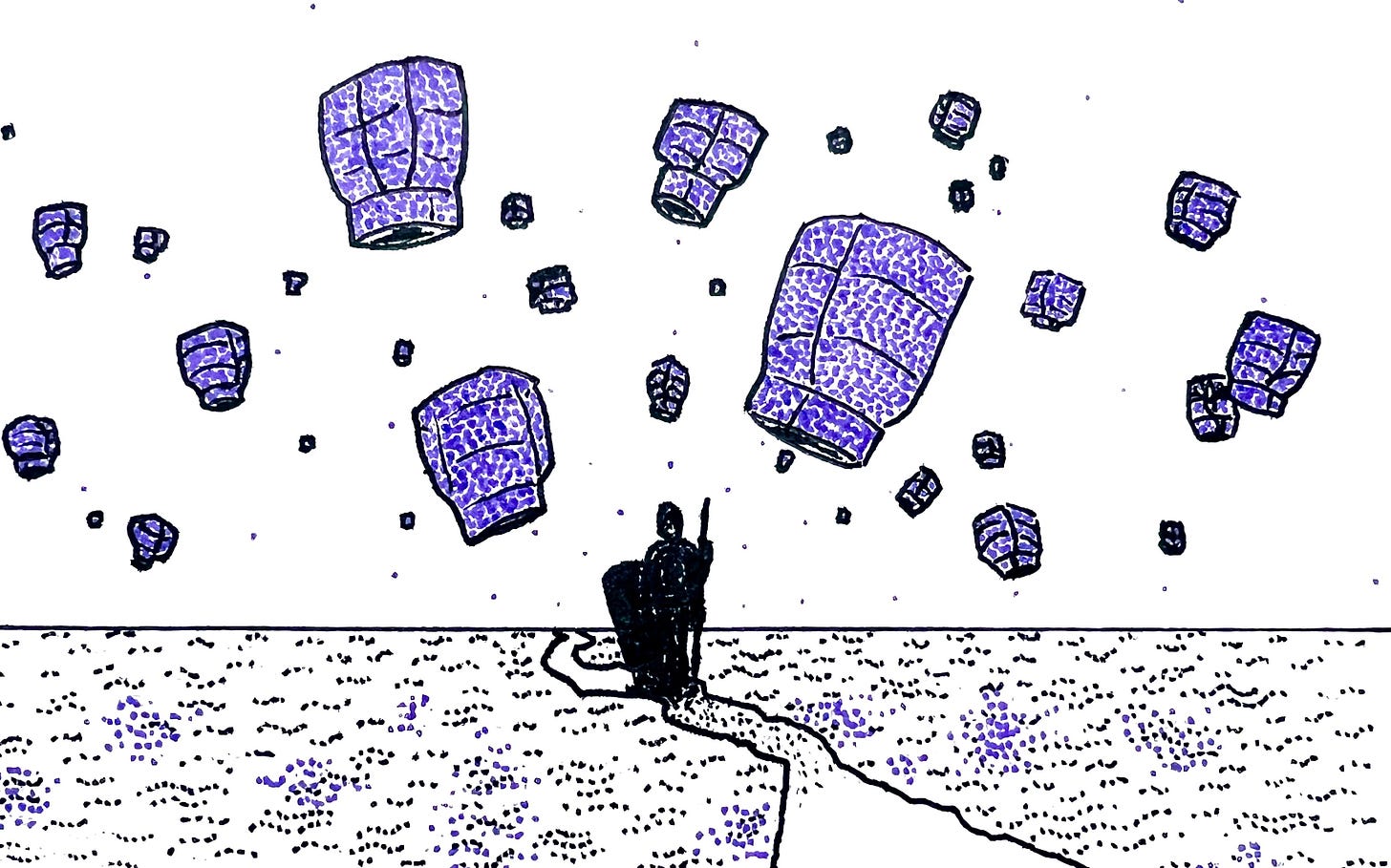

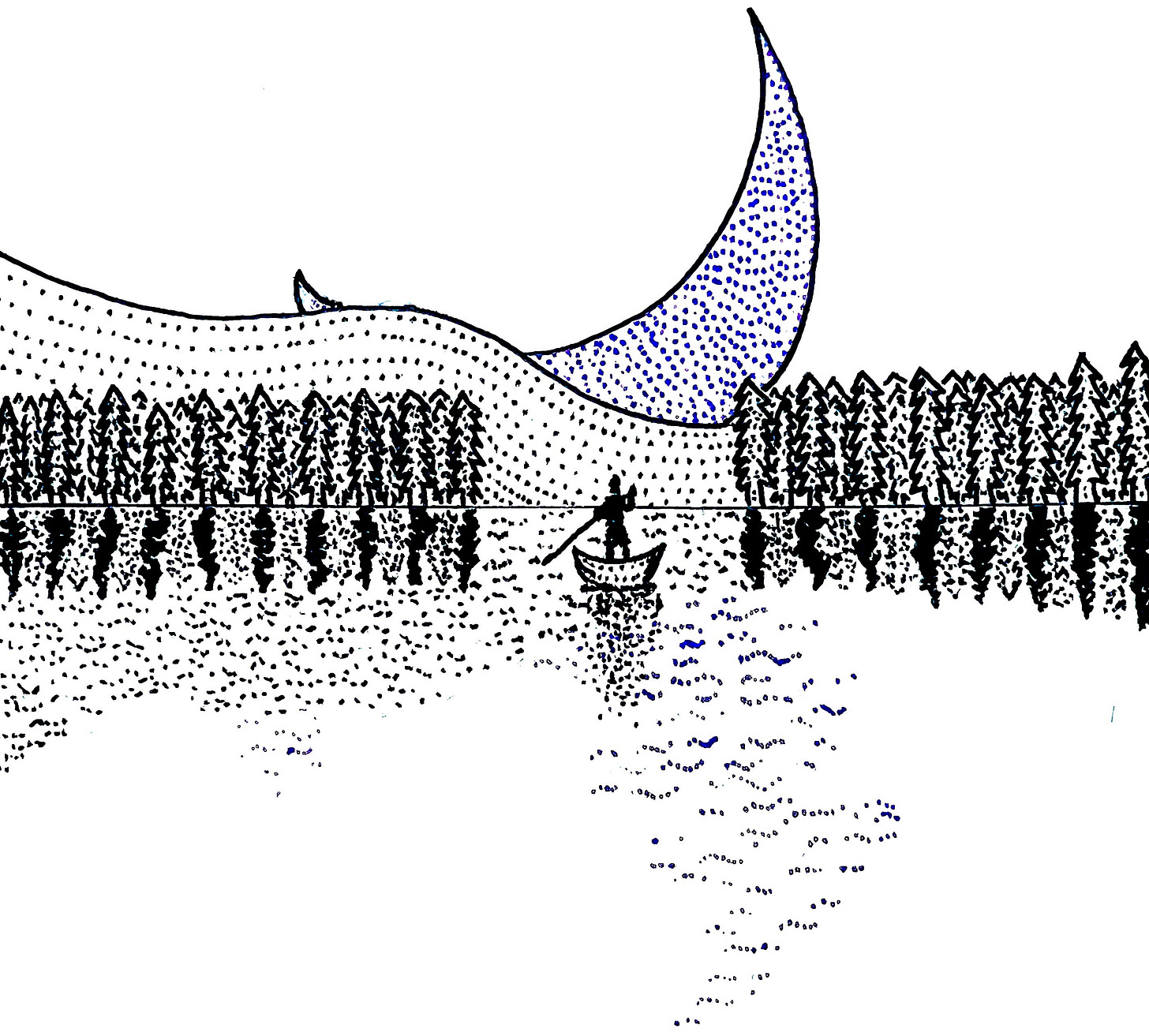

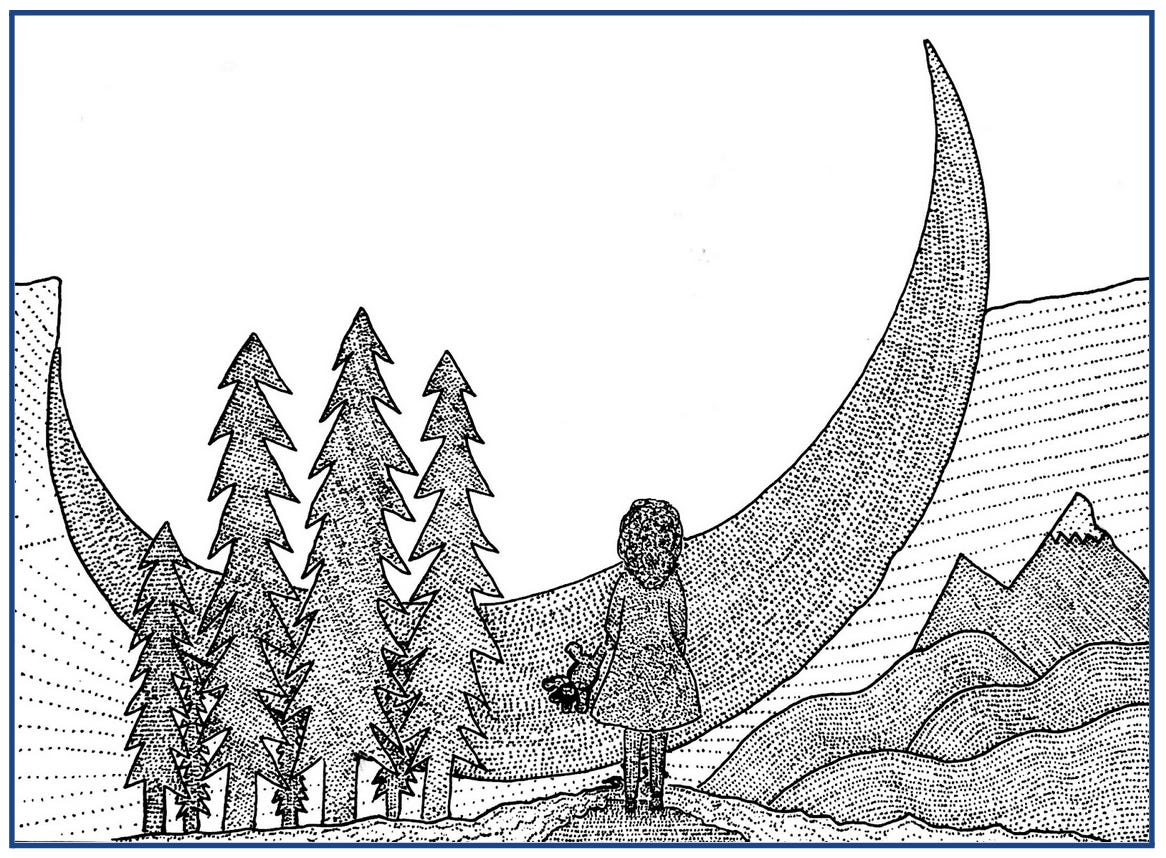
Andrew,
I love how you threaded in the wisdom of your Jewish faith and tradition here. Over the past few years, I've deepened my relationship to my ancestral traditions, and see the relevance of that timeless wisdom to our modern struggles. I think our ancestors left us "applied guidebooks" with deep meaning and same underlying themes across the globe; which sometimes gets missed when we stay stuck in divisive dogma.
Thankful for your depth of thought and willingness to share so openly.
Suparna
This piece intrigues me. It was sent to me from a David McGaughey with a PS from the owner of davidalder.com, and I don't recognize either of those Davids. The owner of this substack is someone else I don't recognize. I imagine all three of these men recognize the great value in how this story is told, specifically referring to personal feelings and honesty about them, but ultimately the call for more conscientiousness.
I inherited voluntaryist.com from Carl Watner when he died at the end of 2020, and it has plenty of help for people who are dealing with power they may feel they have not earned, and recognizing the potential for messing things up in a big way. The thing about power is that nearly all the power that ends up creating lots of misery is given away by the people who experience the misery. I wrote something about it around this time last year, about "war" instead of misery, but it can be adapted:
"The trick is not to "stop misery" but to make misery stop affecting you, and help everyone around you make it stop affecting them. It does end up being a full stop of misery eventually, but the part each of us plays is far more personal than that. Also, misery doesn't come from war or the exercise of power or COVID or the last two years, but from how we develop and exercise conscience.
School generally teaches us the insidious lesson that obedience is the hallmark of a good conscience. School has no room for Acton's aphorism that power corrupts. Obedience is the source of that power that corrupts. The only thing obedience can serve without corrupting it is the self. So one solution for the issues raised here, in my mind, is to develop and obey your own conscience, using self-defense against all who pretend to take that responsibility away (by passing laws, for example, or making apps)."